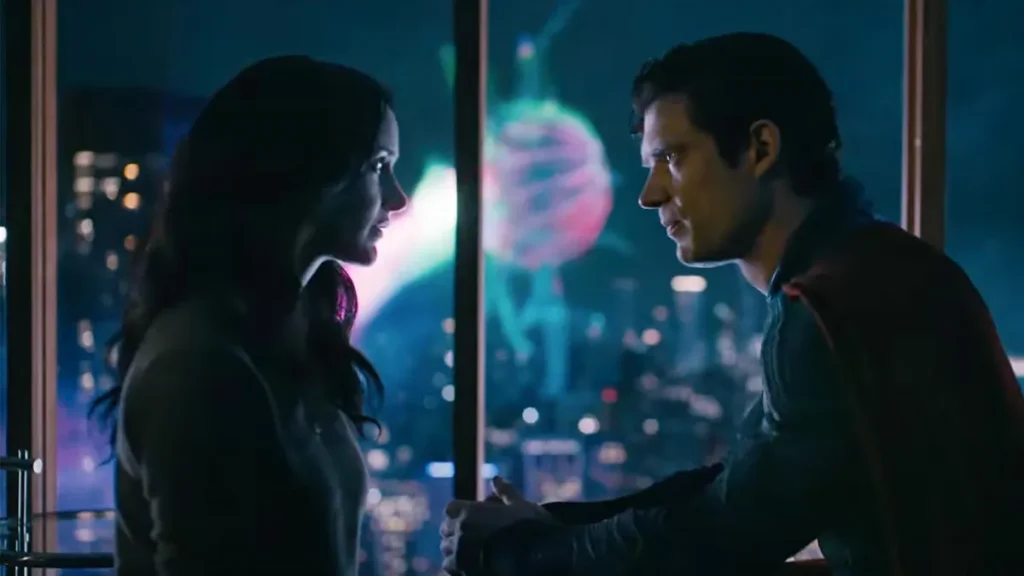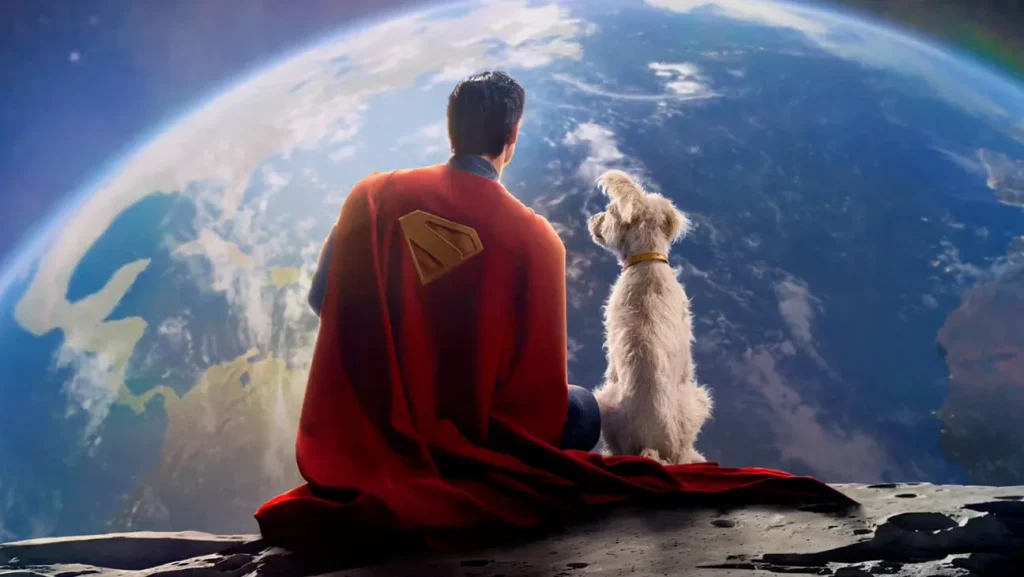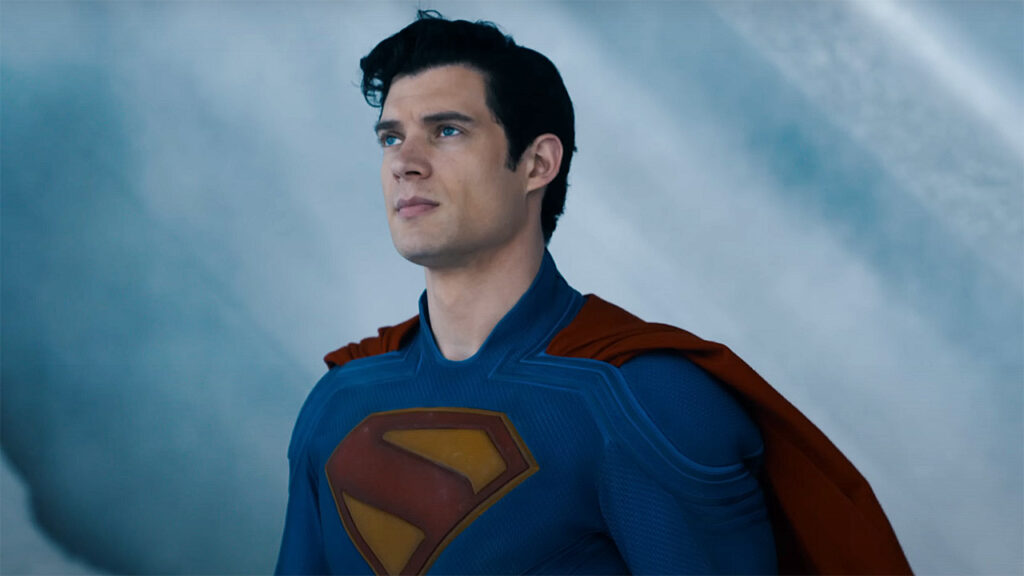In James Gunn’s “Superman,” Lois Lane (Rachel Brosnahan) is falling for the last son of Krypton (David Corenswet), but she isn’t sure why. “I question everything,” she says, bewildered by his eagerness to trust everyone and believe they’re “beautiful.”
Luckily, Superman has a rebuttal at the ready. “Maybe that’s the real punk rock,” he replies, defending not only his do-gooding bravado, but the forces that animate Gunn’s rambunctious storytelling: defiant boyishness, cartoonish humor, and sincere romanticism.
To that, I say: Rock on, dude. A cinematic palate cleanser following the heavy-metal gloom of “Man of Steel” (2013), “Superman” shreds lingering questions about the character’s relevance by declaring that the problem isn’t Superman. It’s us.
“I love! I get scared!” Superman bellows at Lex Luthor (Nicholas Hoult). “But that is being human! And that’s my greatest strength!” His blunt sentimentality practically goads you to snicker—and it’s a testament to the movie’s sheer lovableness that I didn’t.
If “Superman” were any less steadfast in its idealism, it might have buckled beneath its flaws, from a frantic first act to a super-soulless Lex (I still pine for the melancholy menace of Michael Rosenbaum, who embodied the archvillain on the CW series “Smallville”).
Some fans will forgive those transgressions too easily, while others will cite them too zealously. The ideal audience will both face the film’s fumbles and cheer Gunn’s mildly miraculous creation: a Superman who meets his moment, rather than fading into the past or punching into the future.
The last time Superman appeared in a movie that provided him with more than a piddling cameo, he was played by Henry Cavill, who spent “Man of Steel” struggling to conquer a ranting General Zod (Michael Shannon) and his brutish minions (most memorably, an armored Antje Traue).
“Either you die or I do!” Zod roared during the film’s city-obliterating climax. Superman took him at his word, breaking the neck of his nemesis and earning the film a mocking endorsement from the YouTube series “Honest Trailers”: “guaranteed to depress adults—and frighten small children!”

Had Corenswet starred in “Man of Steel,” I suspect that he would have at least tried giving Zod a hug first. Whether he’s rescuing a wayward child or a squirrel underfoot, his Superman isn’t just purehearted. He’s a protector of all life, no matter how inconvenient.
“Don’t be such a wuss,” Guy Gardner/Green Lantern (Nathan Fillion) sneers when Superman mourns the slaying of a monster that rampaged through Metropolis. Gunn may be a goofball, but his screenplay cannily shows how easily cruelty can masquerade as pragmatism—and how rarely compassion is rewarded.
Superman doesn’t truly absorb that reality until Lex spurs the citizens of Metropolis against him, igniting a myth that he’s an alien invader (with a “secret harem”!), then twisting the proverbial Kryptonite knife by kidnapping Superman’s dog, the hyperactive super-terrier Krypto.
“It will undoubtedly be painful,” says Lex, vowing to “put the varmint down.” As far as signifiers of evil go, threatening the poor pooch is a bit superfluous, since Lex already has an army of monkeys and plans for a technological utopia (he’s basically the love child of the Wicked Witch and Elon Musk).
At the start of “Superman,” Lex’s machinations are already in motion: He’s studied his enemy’s moves, stoked geopolitical fires between two fictitious foreign nations, and won the loyalty of Vasil Ghurkos (Zlatko Buric), a vulgar strongman who looks like a hippie Vladimir Putin.
“Brain beats brawn!” gloats Lex, belying the film’s sprawling narrative brawniness. “Superman” may be the first planet in a projected galaxy of DC Comics adaptations, but it often seems like a sequel to a film that was never made, awash in plot convolutions and extravagant powers.
“I was sent here to help make the world a better place,” Superman proclaims. Unfortunately, saving the world is no longer an original idea, thanks to interlopers like Gardner, whose presence rips the film from the gravitational pull of Jerry Siegel and Joe Shuster, who co-created Superman in 1938.
“Jerry reversed the usual formula of the superhero who goes to another planet,” Shuster once said. “He put the superhero in ordinary, familiar surroundings, instead of the other way around, as was done in most science fiction.”
While Gunn preserves many of DC’s mythological building blocks, Superman’s surroundings are no longer ordinary. Instead of believing man can fly, today’s moviegoers are likely to believe Syndrome’s mirthless warning in “The Incredibles” (2004): “When everyone’s super, no one will be.”

Of course, believing a man can fly is not the same as believing in a man. The first fuses an artist’s technical tools with an audience’s waking dreams; the second demands a director who genuinely worships the icon he’s deifying, compelled not only to entertain us, but to convert us.
“Your choices, your actions—that’s what makes you who you are,” Superman is told by his adoptive father, Jonathan (Pruitt Taylor Vince). Gunn believes that and he makes us believe it too, especially during a harrowing scene where Superman saves a baby from an extra-dimensional gulag.
Why is Superman in said gulag, you ask? Because he surrendered to Lex to rescue Krypto. And why is he freed? Because of his compassion for the baby’s father, Metamorpho (Anthony Carrigan), with whom he joins forces in a moment of transcendent kindness that liberates them both.
“I couldn’t be more proud of you,” Jonathan says in the aftermath of the escape. Superman and Lois may be the story’s romantic heart, but the film is touching because of the emotions earnestly shared between its men—even Superman and Lex, who is challenged by his rival to reclaim his lost humanity.
In past films, it was Superman who was in danger of being lost. “Man of Steel” was so misanthropic that you had to wonder if anyone behind the camera actually liked the character, while Bryan Singer’s “Superman Returns” (2006) used Lois Lane’s newfound ambivalence about her Kryptonian suitor to reflect humanity’s.
“The world doesn’t need a savior,” Lois (Kate Bosworth) tells Superman (Brandon Routh) on the roof of The Daily Planet in “Returns.” Yet in the film’s final moments, she types a telling headline: “Why the World Needs Superman,” followed by a blank page and an expectantly blinking cursor.
Nineteen years later, Gunn has filled the space. In an age where decency is treated as a bad joke, he dares not to laugh—even as he cheekily exposes the gulf between Superman’s world and our own by having a character crack, “It seems like the one thing conservatives and liberals can finally agree on: Lex Luthor sucks!”
In an America ruled by a democratically elected tyrant, getting moviegoers to agree that Lex sucks and Superman rules may be too much to ask. Nevertheless, Gunn heroically tries, channeling Superman’s strangely moving mid-battle cry: “Good gosh! There’s got to be a better way to do this!”




One Response